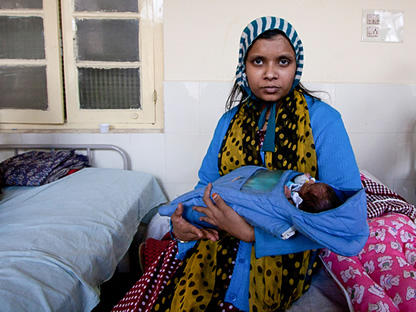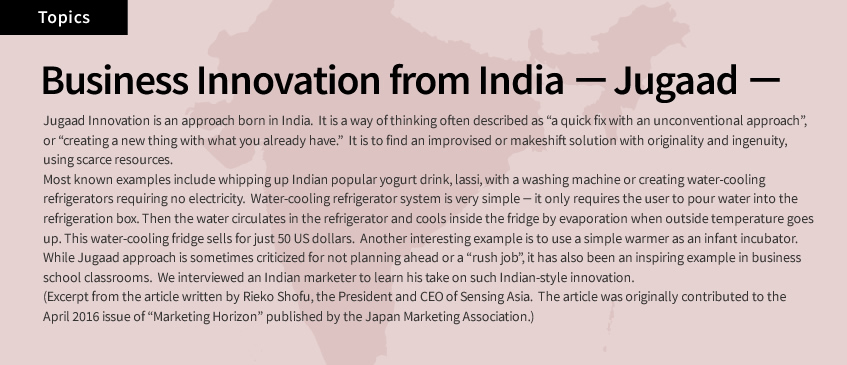
Chandan Keerthi
Mr. Keerthi started his professional career as an advisor for ASEAN and Middle East market at a Korean brand. He has worked with Forrester Research and Nielsen, and is currently a BtoB Research Head of Kadence APMEA. He works for Sensing Asia's project as a partner member.
Shofu : To my understanding, Jugaad is a "way of life" in India where washing machines are used for whipping up yoghurt drink.
Nevertheless it seems to me that the Jugaad theory, typified by concepts such as "Do more with less", potentially has huge implications to marketing strategies for Japanese companies as well as western companies these days. As a marketer based in India, how do you evaluate Jugaad in terms of product/services and business model innovations?
Keerthi : Jugaad is just an Indian way of doing things, or Indian approach to everyday life.
Jugaad as a concept has certain merits and demerits from a product or a service innovation point of view. So selective learning would be advisable. Choose what's best and leave the rest. For example, businesses have to be scalable and autonomous; a quick fix solution may neither be scalable nor autonomous.
But businesses also have to be innovative and lean, which can definitely be learnt from Jugaad. It emphasizes on the importance of being frugal. From a business standpoint that would mean being lean and efficient in your approach, just as in The Lean Startup*1, which advocates the process of build, measure, learn and then implement. A fine balance between quality, efficiency, and wide-spread compatibility is extremely important while leaning for Jugaad.
Shofu : In your opinion, why has Jugaad increasingly become business buzzword in western countries, especially at Silicon Valley?
Keerthi : It has more to do with culture shock than real value. Looking at a picture of someone from a different country fix a problem, or do things in a different and totally unexpected manner, out of the very ordinary but out of the box, at a fraction of the cost -- is fascinating. But so is Silicon Valley: for the East, looking at a picture of someone solve a problem in California with an app at a fraction of the original cost is fascinating.
We're always fascinated by something that we've never experienced before. As far as becoming popular in business is concerned it had more to do with cutting costs and outsourcing. It wasn't just innovation which fascinated western businesses but, its reasonable price (frugal aspect) too.
Shofu : Could you please give us recent examples of Jugaad innovation in India?
Keerthi : One fine example I can think of in business world today is "cardless" withdrawal from ATM -- a solution provided by the ICIC Bank, the biggest private bank in India. This solution allows users to transfer funds to a designated phone number, and allows withdrawal on the phone number with added access credentials. The access credentials are sent to mobile phones via SMS. This is an innovation to withdraw cash from ATM machine without ATM card.
There was a time I was traveling, away from home - and I've keyed in incorrect pin thrice, resulting in blocking of the card. This helps in different situations - even in a chaotic but quite possible scenario where the card is lost or robbed - cardless withdrawal can help avoid fraudulent/misuse of card.
Shofu : So one can use this service even if s/he has no bank account at ICIC. It would surely be a big advantage in India. I found a customer testimonial like this:
"I needed to send cash urgently to my mother's care giver, who does not have any bank account, and lives far away from my house. I came across this service while surfing the net and thought of trying it since she had ICIC Bank ATMs near where she stays. All I needed was her mobile number to send her money!"
Keerthi : Exactly. Most people in rural area of India or the low-income bracket do not have bank accounts. It is the most convenient solution for such people when they need to transfer or receive money. Also, while interbank transfers work only during banking hours, "cardless" withdrawal works 24/7, as this runs independent of existing bank account system.
Another example is Mobile to Mobile money transfer. Among such services "Instant Money Order" service by Indian Post meets money transfer needs in remote areas of India where no banks or ATMs are present but only Post offices.
These services can be seen as success cases in terms of Jugaad spirt, in the sense that they helped people achieve their financial independence, solved the extremely important market needs and are socially relevant, as they use already available technologies for other purposes.
Shofu : In Japan, "Embrace Innovations"*2 is introduced as one of the famous examples of Jugaad, or especially of "Do more with less". What is your take on this?
Keerthi : Calling it innovation may be a little overrated. In India, the most successful businesses focus on two things - solving burning market needs and executional capabilities. "Embrace Innovations" is a fantastic company. But I think they did not take an innovative approach but rather the one of Jugaad's, in solving serious market needs of protecting newborns.
Unlike most western countries Indian citizens are not protected by social security. We don't take care of our own. So for the poor, prevention via affordable diagnostics was the only solution.
Shofu : How often do you return to Jugaad sprit as you plan something new?

Infant warmer developed by Embrace Innovations (from the Embrace Innovations website)
Keerthi : Jugaad doesn't really enter in the planning stage but in a projects execution stage. Because when we plan something, we use ideal business scenarios to forecast projections and schedules. But when we execute, reality throws a wrench into the planning machine, and that's where Jugaad comes in. When usual plans don't work, that's when we explore alternatives, or different ways of doing things. There's a saying "Everyone has a plan until life punches them in the face. That's where your ability to hustle, make things work during adversity really count. You're ability to be resourceful, adaptable and innovative will help you get through."
In my experience, there was one time when I had to recruit medical professionals in the US on a project. Traditional approach was to go to medical panels or call hospitals, or get directories and approach from there. That didn't work out, because we were looking for people whose expertise lies in a very niche area. Then I approached them on Facebook - connected with many, one through another, and went about execution with much success.
Do more with less is a part of everyday lifestyle. in Rural India, you'll find babies cradled in what's made of saree, hanging from the logs running in the roof - it's just about acting flexibly, keep it simple, and doing more out of less.
*1 A book written by Eric Ries. As it was published, it attracted a lot of attention as a new startup means born in Silicon Valley. It advocates for the new approach for increasing the success rate by first checking the customer's reactions with low-cost prototype products, and then modifying the products based on such reactions - and repeating this process.
*2 In developing countries, many prematurely born infants lose their lives as they lack the body fat necessary to regulate their own temperature. Incubators are too expensive and thus rarely available in rural areas. Embrace Innovations developed a simple and reasonable infant warmer with a heating system using hot water without requiring electricity.
Our Services
Rapidly providing most essential information for initial stage in business extension abroad, including local environment, business information, market information for individual industry. Industry information of the considered countries can be found here without spending hours and the need to contact multiple sources.

In this advanced type service, we provide information needed at the detailed investigation stage for market entry, and conduct research on local information of relevant industries, candidates for joint enterprises or business partners, and industrial structure and market needs, all customized upon your particular request and needs.
Customer or consumer survey of specific industries and segments, including particular category products, service. We can conduct both B2B and B2C survey.
Report consists of collection of specific company information. Useful for competitor analysis, pre M&A.



